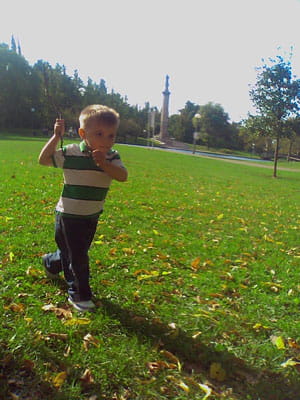Gino Zurich’s parents had never spent a lot of time around kids. Nonetheless, when the couple – Greg, who hails from Pittsburgh and Maria from Moscow – found out they were pregnant with their firstborn, they were nervous, but excited.
Maria had a normal pregnancy and childbirth. When Gino was about 9 months old, his parents began to have some concerns about his development. After conversations with his pediatrician and visits to a child neurologist at 18 months, nothing was found physically wrong, but he was diagnosed with a global delay. Global developmental delay is an umbrella term used when children are significantly delayed in their cognitive and physical development.
A Roller Coaster of Diagnoses
 Meanwhile, Gino’s symptoms progressed. In addition to his delays, he had a high tolerance for pain as well as hypotonia, or decreased muscle tone.
Meanwhile, Gino’s symptoms progressed. In addition to his delays, he had a high tolerance for pain as well as hypotonia, or decreased muscle tone.
When he was 4-1/2, Gino, who couldn’t yet walk, had to be rushed to the emergency room. He’d cracked his head on a door, requiring stitches and a hospital admission. At that time, he was diagnosed with mitochondrial disease.
A later visit ruled out that diagnosis.
Then, Gino was diagnosed with autism. The family worked on therapies including massage, walking, swimming, and physical and occupational therapies. They modified his diet and took chemicals out of his environment. At 9 years old, Gino’s diagnoses included ADHD, cerebellar palsy, and cerebellar atrophy.
His parents were increasingly frightened, depressed, and isolated.
The Path to UPMC Children’s
When Gino turned 10, the Zurichs went to UPMC Children’s Hospital of Pittsburgh. They met with a new child neurologist, Jenna Gaesser, MD, who recommended they repeat genetic testing that had first been ordered by Dena Hofkosh, MD, when Gino was 2 or 3 years old. So many advances had been made in the intervening years, both in the testing and in the science, Dr. Gaesser said, and they may learn something new.
“The Zurichs’ love, determination, and commitment for Gino’s developmental progression is palpable,” says Dr. Gaesser. “From my first time meeting them, I knew my role in Gino’s care team was to listen, support the Zurich family’s already amazing efforts, and to try to get a diagnosis or an answer with genetic testing.”
The chief of the Department of Pediatric Radiology met with the family to study in detail the three magnetic resonance imaging (MRI) scans he had undergone – at 18 months, 4-1/2 years, and 5-1/2 years.
“We could see the progression of Gino’s losing brain cells,” says Maria.
They agreed to move forward with the genetic testing and another MRI.
Even moving to genetic testing wasn’t swift. The Zurichs met with Jodie Vento, MGC, LCGC, a genetic counselor and manager of the Center for Rare Disease Therapy at UPMC Children’s Hospital. Financial coverage of the testing was initially denied by the family’s insurance company because it was considered research and there was a remote chance it would be curative. She helped guide them through a grievance process. It took six months to complete the entire process. Finally, in June 2018, a diagnosis: KIF1a Associated Neurological Disorder (KAND).
Considered a rare degenerative condition, KIF1a is a spontaneous genetic mutation – there is no history of this genetic disorder on either side of Gino’s family. According to KIF1a.ORG, only about 300 people worldwide have been diagnosed with KAND, though many more may be living with it, undiagnosed. Perhaps most frustratingly, many individuals with KIF1A are misdiagnosed with cerebral palsy or other movement disorders before the underlying cause of the disorder is revealed through genetic testing.
“Gino’s story is like many other individuals with rare disease,” says Ms. Vento. “On average it can take over 7 years to find an accurate diagnosis. We are working to improve this at the Center for Rare Disease Therapy. The Zurichs’ perseverance and advocacy combined with advanced genetic testing helped find the answer for Gino. It is wonderful to see how finding an accurate diagnosis has helped Gino and his family thrive, and it’s been a pleasure to be a part of their journey.”
Settling Into Routine
Maria says, “Gino had been diagnosed with multitude of things in the past, and we were skeptical. We went through the stages of grief when we got Gino’s diagnosis. The focus became, how can we help him live a fulfilled life?”
Now 13, Gino is a student at the Watson Institute in Sewickley, Pa. He rides the bus there every day – an hour each way from his home in Oakmont, Pa.
“The Watson staff is phenomenal. Everyone there supports the children, no matter what condition, no matter how big or small or tall. So they can have a joy in their lives,” says Maria.
The Zurichs’ pediatrician – their fifth – Catherine Udekwu, MD, has been instrumental in their lives, Maria says.
“If you don’t have yourself in order, you can’t help anyone else,” she says.
Dr. Udekwu and her staff have helped take some of the burdens from Maria and Greg.
“She helped us believe in ourselves.”
Also vital has been the online community. When your child has a disorder as rare as this, Facebook isn’t just one way to keep informed.
“Sometimes it’s the only way,” says Maria. “The answer might be right around the corner. You have to keep looking.”
KIF1A.ORG
KIF1A.ORG is a global community dedicated to improving the lives of those affected by KIF1A Associated Neurological Disorder and accelerating research to find a cure. There is no cure or treatment for this neurodegenerative disorder. Yet. Learn more about empowering KIF1A families to accelerate our urgent mission.









